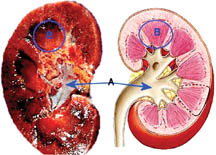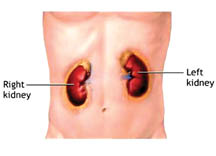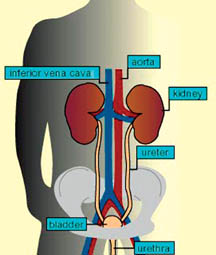|
observer |
|
|
|
|
|
OTHER LINKS |

|

|

|
Body TalkKidneys... The waste disposal unitsYour two kidneys - the renal organs - are the master chemists of the body. They monitor the quality of the blood, separating out harmful substances from beneficial ones. They act as waste disposal units. The kidneys maintain the internal environment essential for life - whatever the diet or the climate. The kidneys filter the blood, clean it and keep its composition balanced. They maintain the correct levels of fluids, minerals and other substances including salt and water. They react to hormones from the brain and produce vital hormones of their own.
We can live quite well with only one kidney - indeed, some people live healthily even though born with only one kidney. But while bones can break, muscles can atrophy (waste away) and the brain can sleep without risk to life, if both kidneys fail - renal failure - neither bone nor muscle nor brain can carry on. Instead, wastes and fluids will build up and poison our whole system. This is why people who suffer from renal failure need to have the blood cleaned artificially with a dialysis machine, or require a kidney transplant. What the kidneys look like... The kidneys are smooth, maroon, bean-shaped organs, each about the size of a child's fist and weighing around 140-170 grams (5-6 ounces). They are located within the abdomen, near the middle of your back, just above the waistline on each side of the spine. They are buried in protective fat - below the liver on the right, below the spleen on the left.
Blood flows into the kidneys through renal arteries, which comes from the aorta, the main artery of the body leading from the heart. The renal arteries divide and sub-divide into ever smaller branches, ending in coils known as glomeruli, which are capillaries (the smallest blood vessels) that act as filters. We have about a million of these hairpin-like glomeruli at birth, but are reduced by a 100,000 with each decade (ten years) of life. Droplets of filtered blood pass through a number of tubules (tiny tubes) into the medulla, a central collecting region. The glomeruli and tubules together make up nephrons, long and extremely fine tubes which, if connected, would run for 80 kilometres (50 miles). The nephrons are the basic working units of the kidneys, controlling the formation of urine. Extending from each kidney is a vein through which filtered blood flows back into the circulation. There is also a duct from each kidney called the ureter, which carries urine to the bladder. How to keep your kidneys healthy * As with all aspects of keeping fit, the basic rule is to be kind to your body - maintain a sensible, balanced diet and do not smoke, take drugs or drink alcohol.
* Drink one and a half to two litres of water a day and drink only moderate amounts of tea, coffee and cola because they contain caffeine. This, like alcohol, is a diuretic - which means that it dehydrates the body. * Stick to a diet high in carbohydrates and low in protein (the main source of waste products) as this reduces the kidneys' workload. * Like the rest of our amazing body, the kidneys are designed to last a lifetime. They do a wonderful job of maintaining our internal environment and should continue to do so, as long as we look after them by drinking plenty of water and eating a balanced healthy diet. What the kidneys do The kidneys keep the blood clean by filtering it to clear it of wastes, such as creatinine, left over from the breakdown of muscle, and urea, from the breakdown of proteins. The filtered wastes are combined with water to make urine, which passes down into the bladder. The kidneys keep the blood in chemical balance (homeostasis), maintaining fluids, minerals (such as calcium and magnesium) and electrolytes (such as sodium and potassium) at the right levels. About 400 gallons (1,800 litres) of blood are pumped through the kidneys every day. The kidneys also regulate water, which accounts for more than half the body's weight. If too much water is lost, as through sweating, the kidneys respond to try to conserve it. The kidneys react to hormones from the brain. They also produce three important hormones of their own: 1. Erythropoietin (EPO), which stimulates the bone marrow to make red blood cells 2. Renin, which helps to regulate blood pressure 3. The hormonal form of Vitamin D, which helps maintain calcium for bones and for chemical balance What can go wrong with the kidneys? There are often no symptoms in the early stages of many kidney conditions. When they do occur, the initial signs may be general - frequent headaches or feeling tired or generalised itching. As kidney disease progresses, the symptoms can include changes in the urine (reduced volume, discolouration, blood or pus), nausea and vomiting and appetite loss. Other symptoms include swollen or numb hands and feet (because of water retention), weakness and lethargy, darkened skin and muscle cramps. |










